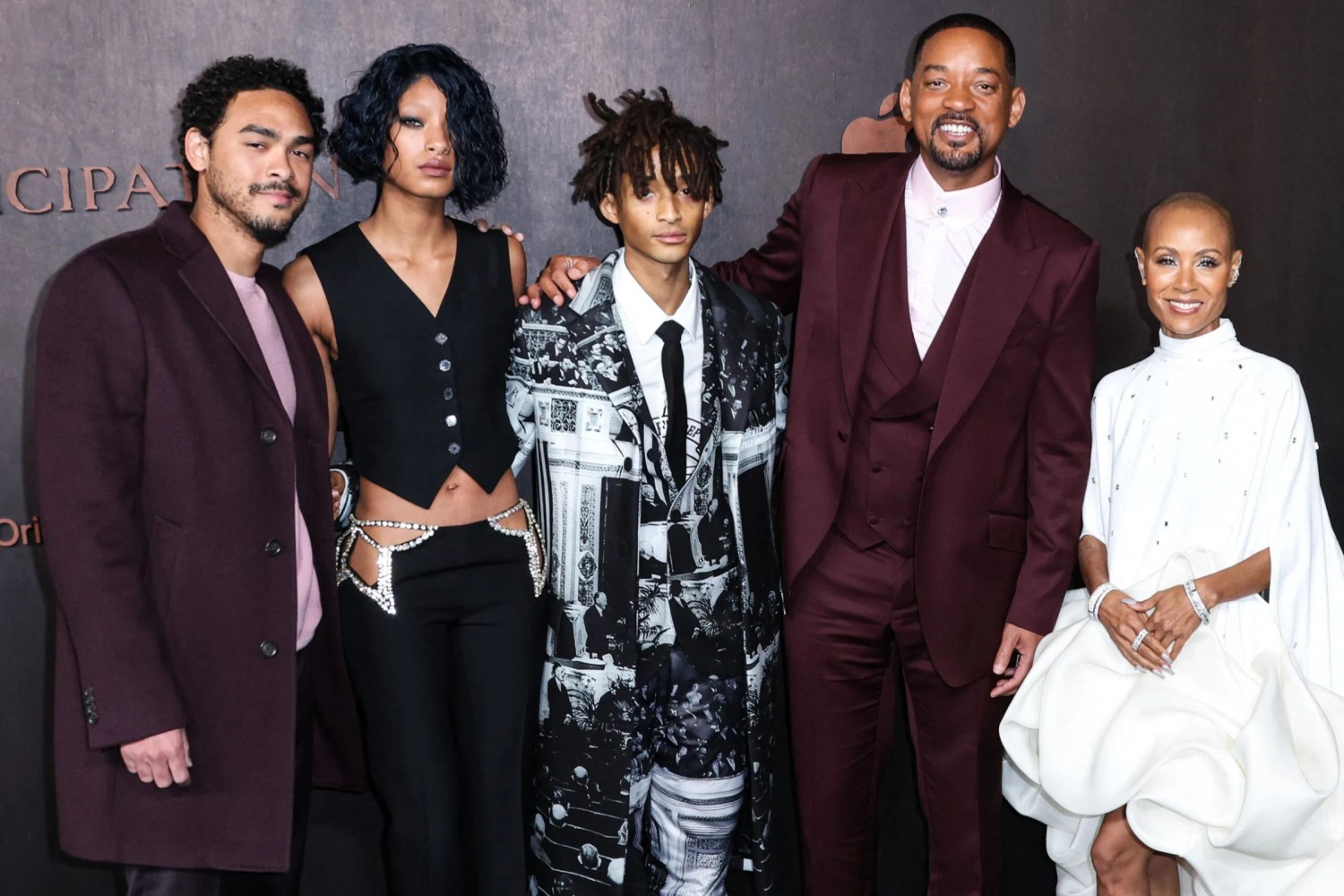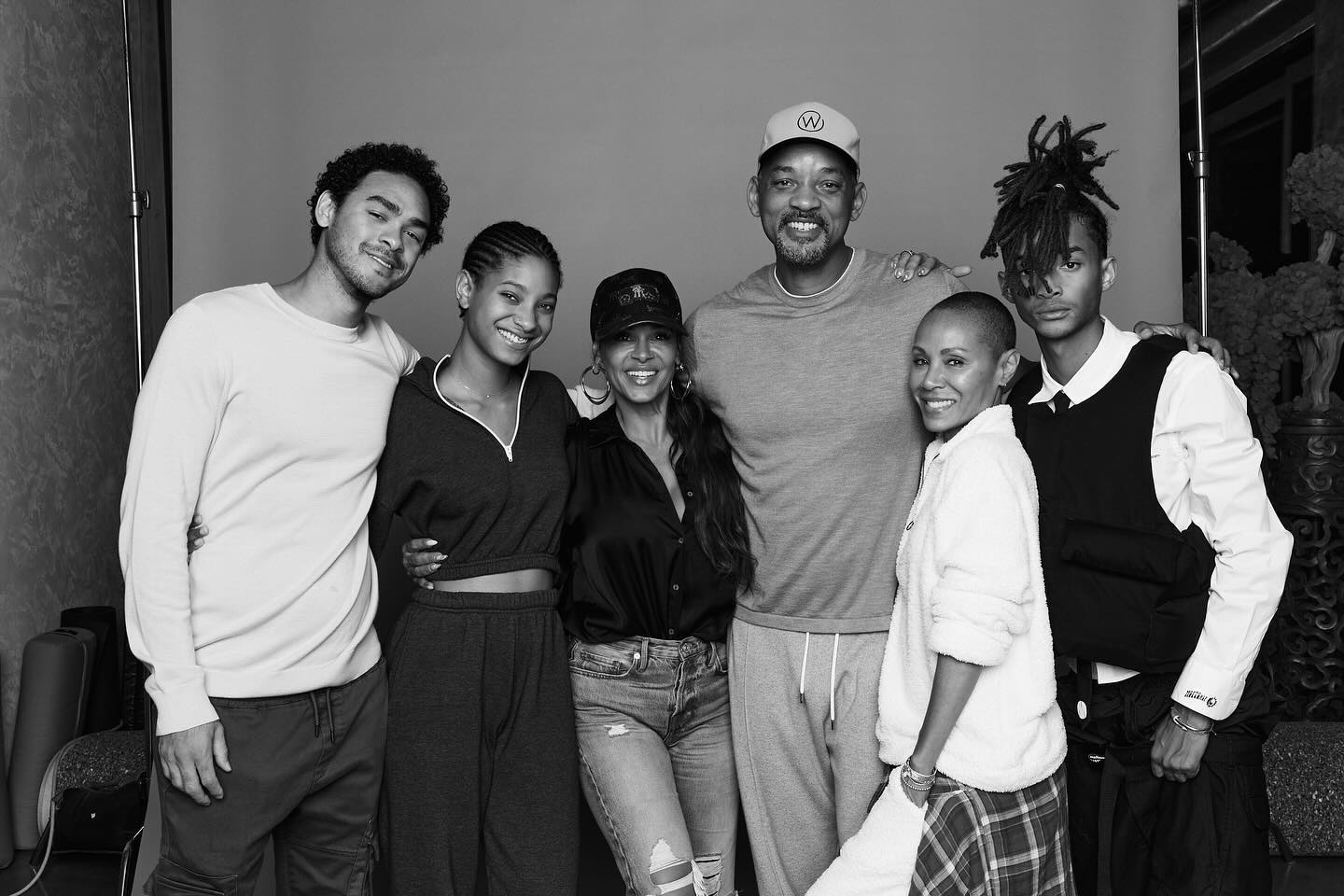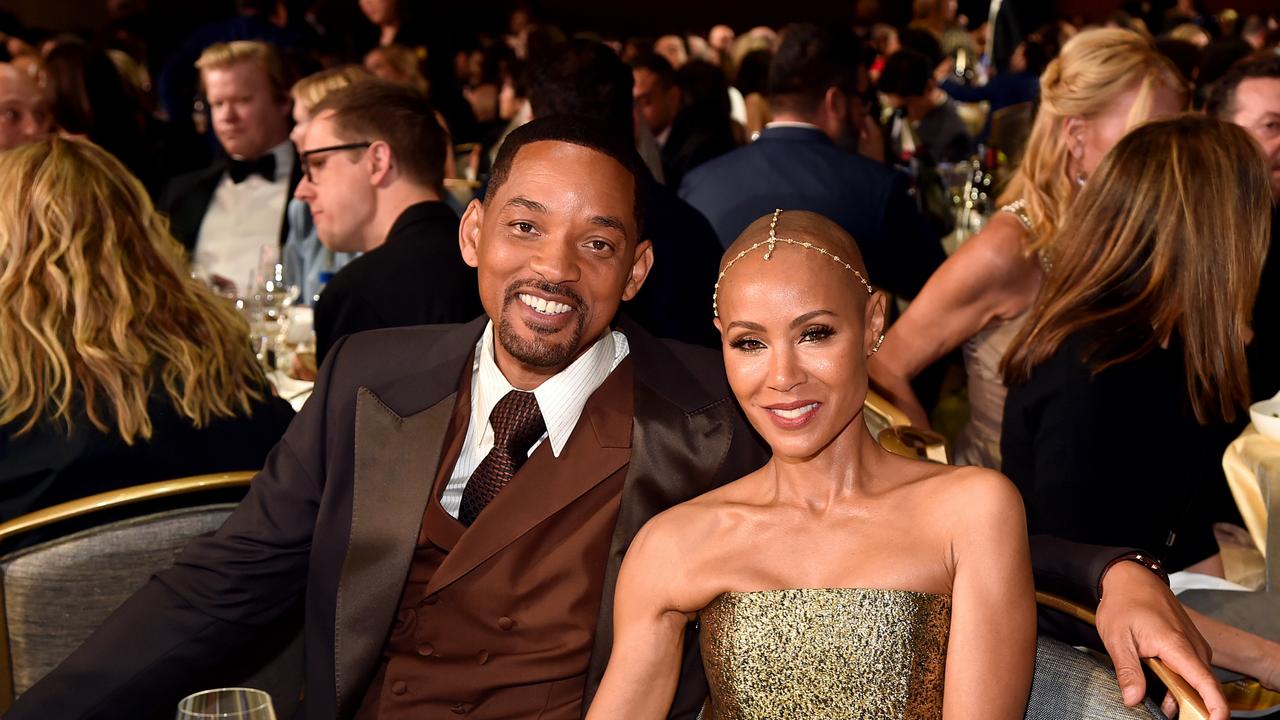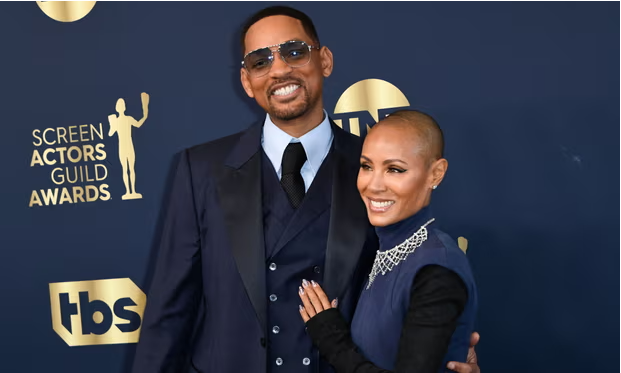This article is more than
1 year oldWhy is everyone so mad at Jada Pinkett Smith?
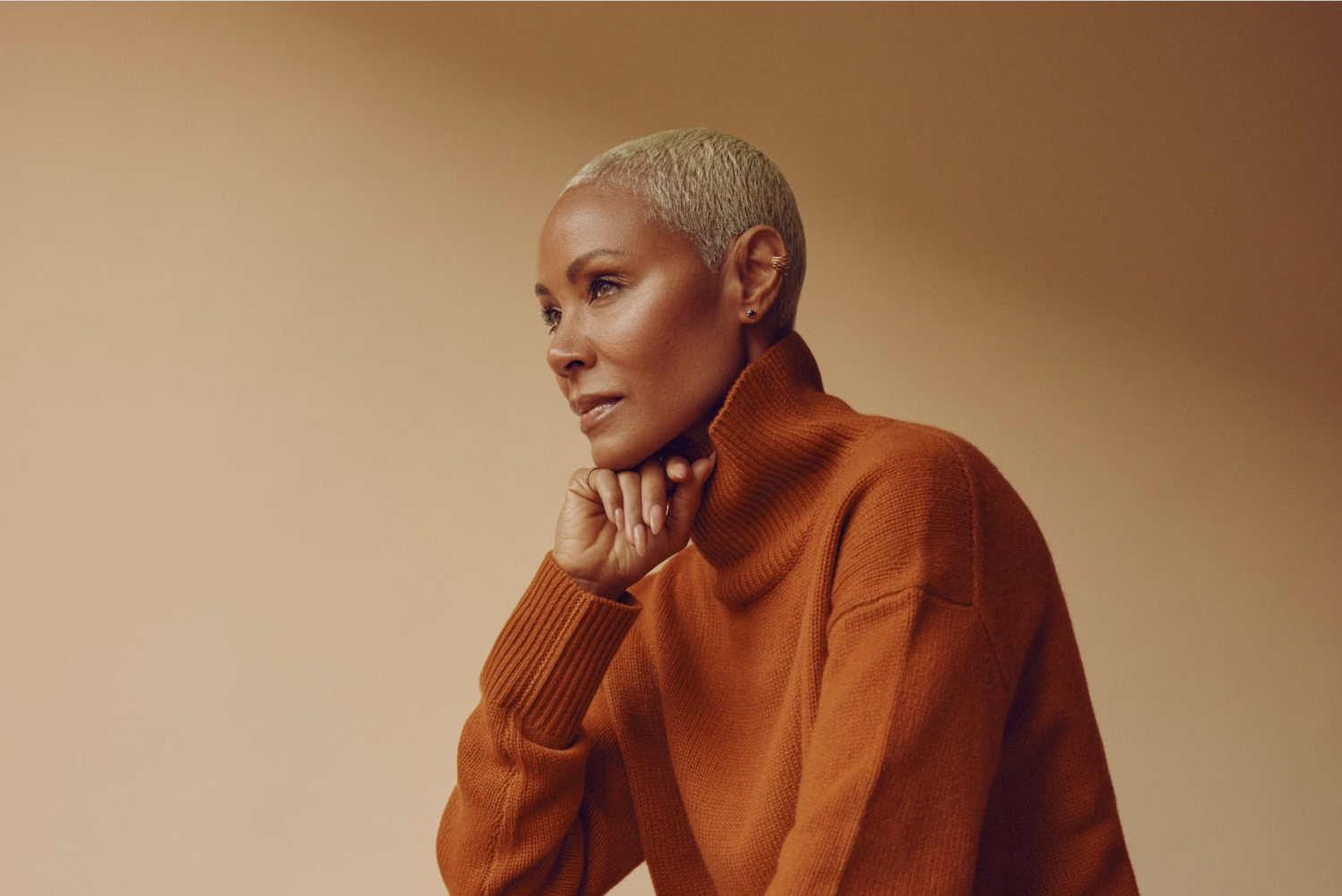
|
Just two weeks in, the publicity tour for Jada Pinkett Smith’s new memoir “Worthy” has been less of a whirlwind and more of a hurricane. The book is over 400 pages of candid reflections on self-judgment, unconditional love and identity. Still, those answers have led to even more questions. Chief among them: Who is Jada Pinkett Smith? But also, like, how? How is she holding on to whomever that woman is? How is she the eye of this storm? “That’s the whole point, you just really have to be centered in your own sphere because what’s happening with everyone else…” said Pinkett Smith before taking one of many considered pauses in our conversation, careful to not appear cavalier. “We’re all our own universes. So you just got to make sure you’re in alignment.” The headlines, sit-downs and subsequent blowback she’s received for cherry picked “revelations” in the book, most specifically that she and Will Smith have been separated since 2016, have created a cottage industry of Pinkett Smith pile-on. “We just lived through Jada’s memoir rollout and I’m tired,” said Sam Sanders on his pop culture podcast “Into It.” “Somebody tell Jada Pinkett Smith to leave us alone,” said comedian and actor Ryan Davis in a TikTok rant that has been viewed 4.1 million times so far. Talk show host Sherri Shepherd, rapper Rick Ross, culture critic Jemele Hill and ESPN’s Stephen A. Smith have all weighed in. Even “Saturday Night Live” spoofed her. “Sorry if I seem a little tired I’ve been on ‘The Today Show’ 14 times in three days,” joked SNL’s Ego Nwodim as a platinum-haired Pinkett Smith. |

|
First, let’s get one thing out of the way. Jada Pinkett Smith is doing just fine. Actually she’s better than fine. The 52-year-old is good good. Her hazel eyes are sharp. The skin is skinning. The woman is glowing. Even her clothes are telling the same story. At the book’s Baltimore tour stop, Pinkett Smith wore a luxe neutral sweater set with sneakers, embodying the word “cozy” in its most Beyoncéfied definition (“comfortable in my skin”). In person the next afternoon, cocooned in a massive charcoal coat over another sable knit set, the actress looks like what she’s found on the other side of the storm. |

|
Pinkett Smith’s tone is telling, signifying with a shift in octave the weight of what’s coming out of her mouth to whoever is sitting across from her. Is she gift-wrapping her words in a soft alto? Welcome the guru — although she is loath to call herself that. This is when phrases like “the Great Supreme,” “shadow,” “the exile lands” and “centering” are sprinkled in the conversation. But the Bal-more accent Hollywood told her to ditch three years ago still comes out to play. Then she’s keeping it “all the way real.” Her neck will get involved. Then there’s her laugh. High pitched and unbound, bolting from her throat and leaping to the ceiling whenever something is really funny because it’s true. And it escapes when I ask, “We don’t really know you do we?” Here’s a list of things we “know” about Jada Pinkett Smith: She has been married to Will Smith, one of the most famous actors alive, for almost 26 years. Their relationship is different. Their three children seem free, well-adjusted. Eventually she started her own wildly successful talk show, “Red Table Talk” on Facebook. The famous couple did an episode together, scratching the surface of a romantic “entanglement” Pinkett Smith had, that did not go over well. Cracks in the Will and Jada carapace became more pronounced. [Video: Jada Pinkett Smith on Washington Post Live talks about her new memoir ‘Worthy’: ] Then when her husband decided to slap Chris Rock at the 2022 Oscars after the comedian told a joke about Pinkett Smith, she was blamed for the debacle despite her long-held public silence. And now after writing her own story in “Worthy,” divulging many details about herself but little actual news about other people, the consensus is that Pinkett Smith is a manic toxic nightmare who should shut up and sit down. |

|
“Worthy” begins with Pinkett Smith at the top of a steep driveway and the bottom of her own well. In those introductory pages, she writes of her first foray into ayahuasca, the plant-based psychedelic she credits with saving her life: “At this point, my level of desperation was so all consuming, all I could think was: What do I have to lose? If it killed me — great, mission accomplished. If not, thank God.” Turns out she’d been struggling with depression — and later suicidal thoughts — since her early 20s. She’d been on Prozac at one point. Then Will Smith happened and love and marriage and family turned down the alarm bells — for a time. “I’d been a high-functioning depressive for so long,” she writes. But an infamous 40th birthday celebration — a weekend-long extravaganza with her closest friends and family — revealed what a mental fog Pinkett Smith had been under. Hopelessness set in and the actress fell apart. “Worthy” is the story of how she put herself back together from the fatherless child to the talented teenager selling dope on the side to the young actress with a chip on her shoulder to the wife and mother who didn’t think she deserved her so-called perfect life. It’s hard to square that woman on the throes of her second mental breakdown with who she is now. Guru or gadfly? Loved or hated? Pinkett Smith, cradling a cup of hot tea in both hands, possesses the kind of calm that is both admirable and enraging. Because how can anyone be this above it all? Who can survive that? Who is she? |

|
“Well, I don’t think it’s a, ‘Who is that?’ That’s the thing,” said Pinkett Smith, laughing at her own inscrutability. “Because the ‘who is that’ is constantly growing. Every day I learn something new about myself.” Such as? “Really just how much work that I’ve done to be able to walk this walk that I’m walking right now — and really feel great,” she said. “When seemingly the world adored me, I was miserable. Now, seemingly, there’s so much hate out there and I’m like so joyful. I wake up every morning so happy to be me, so happy to be alive,” said Pinkett Smith. And it’s there, the sentiment that seems to grate against the collective understanding of who Pinkett Smith should be. Her happiness. Because what is everyone so mad about, really? Her admission that she and Will have been living separate lives for seven years? On a “Red Table Talk” in 2018, the couple said they don’t call themselves married, instead choosing “life partners.” Her writing about Tupac, her best friend since high school? She doesn’t get to him until page 82. Or is it common-sense advice about relationships and investing in yourself like this: “People don’t understand that love levels up, especially if you’re planning on being with someone forever. Love is not meant to be stagnant. So that means that we have to level up,” said Pinkett Smith. “We go into relationships a lot of times to substitute for the things we don’t want to give ourselves or don’t know how. Once I really was willing to learn to give myself that grand love, only then could I then share that love with Will.” Oh the horror! |

|
The mood following Pinkett Smith’s talk at Enoch Pratt Free Library in Baltimore could be best described as exuberantly thoughtful. If fans weren’t rushing to the stage to snap photos of the Smith family (all three kids, her mother, Adrienne Banfield-Norris, and Will, showed up) then they were having head-nodding discussions about what just happened. In a minutes-long speech, Will told Jada — and the world — that he had her back. “I really wanted to come out and just be here and hold it down for you, the way you have held it down for me,” Smith said. Was the woman who had been branded with a scarlet letter as scary as they’d been led to believe? “It’s easy to make her a villain,” explained Shanelle Greene, who was standing outside confabbing with friends. “I think in a world where people are committed to hating Black women for absolutely no reason it was nice to hear her side of the story. She’s a Black woman in America. She’s a scapegoat. She often gets blamed for things that she hasn’t given a voice to.” Greene and her group, who call themselves the Queens Circle, were in search of cocktails to further debate what they heard inside. “I don’t relate to her per se,” said another friend. “But I’ve been on a journey myself and when you’re on a journey people just don’t understand you.” The group went on to dissect the finer points of being “bulletproof” vs. “impenetrable” and whether Pinkett Smith, seemingly so above the criticisms hurled at her, could still remain open and receptive while protecting her peace. “But you don’t want to have that change the perception of self,” added another friend. “That’s the part right there,” added Pinkett Smith — using one of her many meme’d catchphrases — when I recount the Queens Circle’s back-and-forth. “The most magical healing elixir I found is curing self judgment. Then you don’t have a weapon within yourself that someone else’s judgment can ignite. But it’s not about putting up walls like ‘This doesn’t affect me.’ No, I understand, I totally get it. That’s just not where I’m at now. You might think that way about me but I know I’m not that.” |

|
What Pinkett Smith is, is vocal. She’s a “well-written-upon” woman, to borrow a quote from Clarissa Pinkola Estés, author of the bestseller “Women Who Run With the Wolves” and one of her faves. She is a woman talking too much. A Black woman taking ownership of herself. A woman who loves herself fiercely, perhaps even selfishly. Why are you mad? So I want to go back to all that “seeming hate” Pinkett Smith underscored at the beginning of our sit-down, but before I can fully form a question the actress already has an answer. Pinkett Smith has a different term for it — “shadow.” It’s the sort of voluntary darkness that serves to cloak our understanding of self. (See, sit with her long enough and this is how you start to think.) The shadow archetype was first introduced by psychoanalyst Carl Jung. |


|
“It’s a very complicated dynamic. It’s a lot there. But it doesn’t have anything to with … anything really,” said Pinkett Smith with that high pitched laugh. “The same people talking mess online, if they saw me in person they’d be the same people wanting a picture, you know what I mean?” That sounds ego driven. But then she told a story from her personal history, a big reason the blowback isn’t knocking her over. This is in the book, too. In 2005, Pinkett Smith and her nu-metal band, Wicked Wisdom, performed on tour with Ozzfest, founded by Sharon Osbourne and her husband, Black Sabbath frontman Ozzy Osbourne. The raging crowds were overwhelmingly White. “I learned a lot being out there in what we would call the belly of the beast where there’s real hate,” she said. During a show in either Kentucky or Kansas — she can’t remember which K state — two White teenage boys screamed from the back of the crowd just as the music died down: “N----- b----.” Yeah. Pinkett Smith and band kept it moving. Later, while the band was signing posters in the lobby of a hotel, those same two boys showed up. Pinkett Smith motioned for them to come over. “I signed something for them and they took a picture.” That was a lesson in shadow. What’s happening now seems sort of quaint in comparison. “That’s why I can sit in some smoke,” she said. “Because I’ve been in places and in situations where you think, ‘Oh, this smoke right here, this could be life or death.’ People want attention. People are angry about what’s going on in their own lives. They are just projecting stuff. Most of it’s not real.” “If we’re not looking at our traumas. If we’re not looking at our hurts it creates the shadow within us that needs expression. Once we start healing you get more conscious of it and you direct that energy differently. We all have it. I’m not trying to say I’m clean of shadow. I’m just in the practice of giving it a different job,” said Pinkett Smith. |

|
Right now Pinkett Smith’s job is to tell on herself. But only so much, only the parts that might help. Because there are, in fact, details of her life that she keeps to herself. “I have all the respect for every face of God. I feel for me there’s certain practices that speak to me, which I won’t talk about,” she said. “The thing I don’t talk about is religion and politics.” Of course because of the criticism — “Uh-uh. No. Not that at all. I never have. It’s just … that’s a very personal thing. And that’s it,” said Pinkett Smith. And despite all the so-called revelations in the book, which are all centered on men (Will, Tupac, Chris Rock) most of what she writes about other characters is road already well-trodden. “As much as people think is in the book there’s so much that’s not. What people consider to be oversharing for me, it’s like, ‘Baby I’m scratching the surface,’” said Pinkett Smith. Originally she turned in a 600-page manuscript. There’s enough on the cutting room floor for another book. Or maybe she and Will might even write a one together about how they’ve arrived at this “bru-tiful”(that’s beautiful plus brutal, according to Will) juncture. “And there ain’t much in there. Like it’s no real tea about Will. I would never. I would never,” she said emphatically with a distinct twinge of Bal-more. “It’s just universal s--- that goes down with partners in general.” If you haven’t read “Worthy,” you might roll an eye or two at that. Will Smith and Jada Pinkett Smith are not a normal couple. But read it. They are though. Resentment, avoidance, poor communication, discordant values, taking one another for granted, simmering rage, reconciliation in the face of a crisis — it’s all there. Which, of course, prompts the $64,000 question: So are you together? “I’m always careful with that because we are together in the way that makes us happy,” said Pinkett Smith, who even has a working title for their joint book project: “Don’t Try This At Home.” It’d be about how to have a “healthy fulfilling happy relationship.” Look — she gets it. How the Smiths choose to define and redefine their relationship is a hot topic. “To keep it real, look when I realized that the romanticized version of my marriage would never exist, I was mad too. I was p-----,” said Pinkett Smith. “I could see how that would p--- some people off.” But remember, that’s shadow. She wants us all to pour some love on it and give it a different job. Meanwhile Jada Pinkett Smith is going to keep talking. She’s going to write, produce and direct (maybe even act if the mood strikes her). And she’s bringing “Red Table Talk” back, because she’s learned her lesson. “Now I can really talk. Now we can dive in. We can go deep now. Because I’ve been able to tell my story in an in-depth way. People have a lot more history and a lot more context. And now we can go just a whole ’nother layer.” |
(Washington Post Live) |
Keywords
Newer articles
